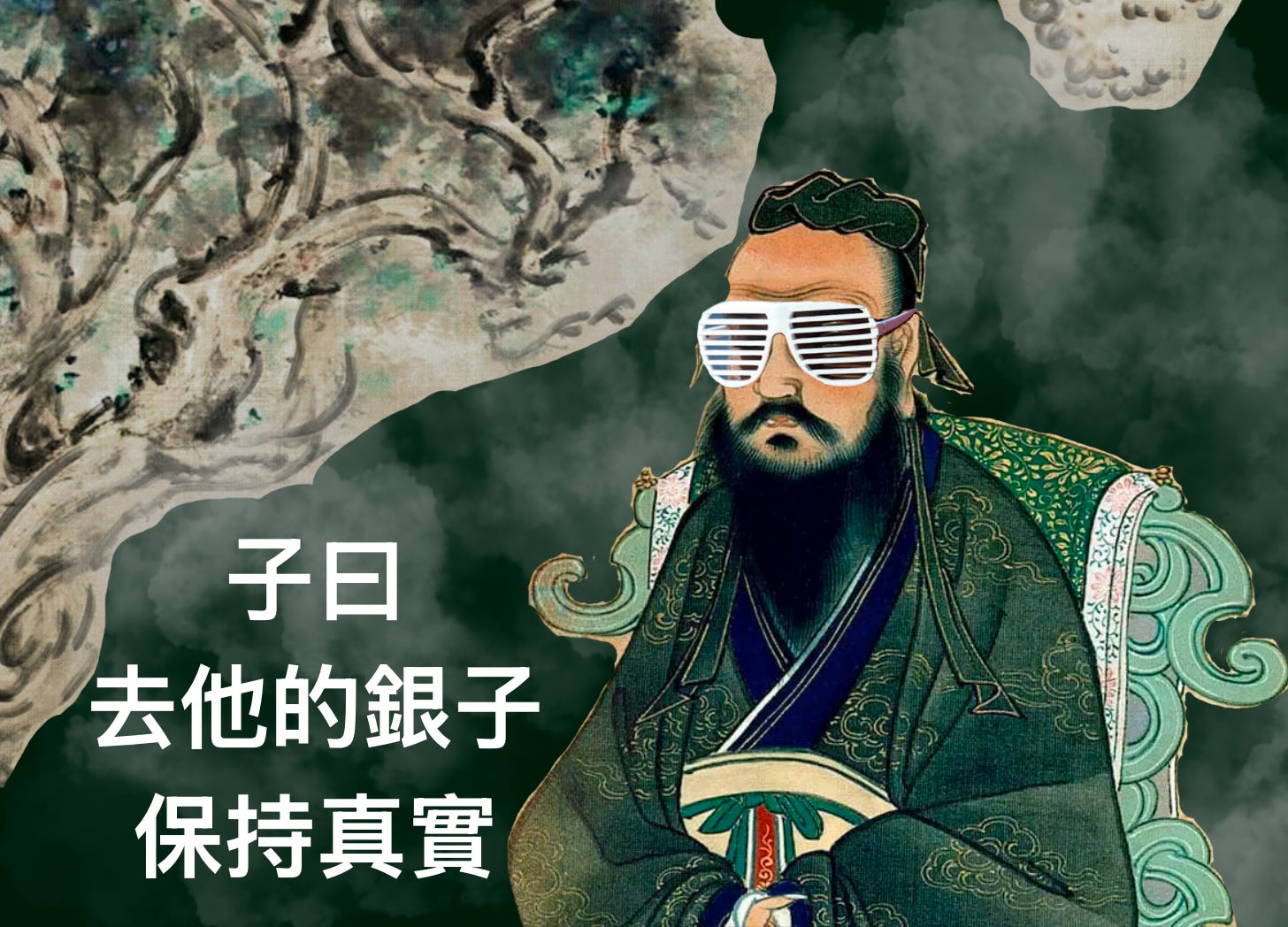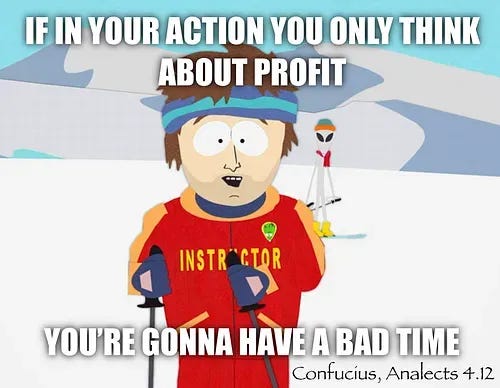[BONUS] The Master Said: “F— the Paper; Stay Based”
Turning to Confucius for career advice
The Spring and Autumn period wasn’t necessarily a bad time to live in China—but it wasn’t the best time. For this 250-300-year period, the Eastern Zhou dynasty lived in a state of slow decay. The Western Zhou capital had been razed, and petty lords increasingly did things their way instead of deferring to the Zhou court, but…China wasn’t at the Warring States period yet. Twenty-seven centuries later, historian Hu Wenhui would describe this period as a “garbage time” for the Zhou Dynasty. The sky was not actively falling, but it was known that The Way was lost, that the Zhou Dynasty was cooked. The timelines are compressed in the American context, but the vibe…feels familiar.1
Confucius wasn’t the only Great Thinker reckoning with the poor vibes of this era. Lao Tzu was a Zhou archivist during this era, reportedly churning out the Tao Te Ching in one manic session before noping out of his day job and becoming a hermit. Sun Tzu, meanwhile, wrote2 an Art of War that sometimes reads as exasperated tutorializing:
Attack him where he is unprepared; appear where you are not expected.
If the campaign is protracted, the resources of the State will not be equal to the strain.
In war then, let your great object be victory, not lengthy campaigns.3
Confucius, meanwhile, was a pretty baseline civil servant for a convulsing Lu government, until those convulsions forced him into an early retirement at age 53. For the next fourteen years, Confucius wandered the many states of the Eastern Zhou looking for work and finding…nothing. The rulers of Wei, Song, Chen, Cai, and Wei (again) were not interested in a highly-competent late-career civil servant, because who wants to effectively run a state when there’s money to make, parties to throw, and crises to manage? Or something like that. During his exile, Confucius built a reputation for wisdom and collected a flock of disciples—and only his immense victory in the Chinese Marketplace of Ideas could secure him a sinecure job in government…at the age of seventy.
子曰吾十有五而志于学三十而立四十而不惑五十而知天命六十而耳顺七十而从心所欲不逾矩 [2.4]
The Master said: At fifteen, I set my heart on learning. At thirty, I established my standing in the world. At forty, I was no longer confused. At fifty, I understood my calling. At sixty, I could hear the truth. At seventy, I could follow my heart’s desire without straying from the path.4
When I was in high school, I started writing and making art to impose upon myself the challenges I could not get in school. Now that I’m approaching thirty, I can feel my standing coalescing—at least on Substack if not on Hinge.5 But I’m still deeply confused, and I doubt that I could identify the truth even if it shouted in my ear. I suspect Master Kong would suggest patience—it’s not like he figured it out at my age.
No One’s Hiring for Lǐ 礼
I am, in a Confucian sense, a shì 士. I’m an educated man, a civil servant, a young professional aspiring to knowledge and virtue, a man trained in How The World Works. And in the spiritual sense, I’m a model of a neurotic Confucian disciple—I want to be useful to my country, but no one’s hiring experts in lǐ 礼—“the rites,” ritual and propriety, operational effectiveness, the tie I should wear to work versus the New Balances I wear instead.
It’s a hard economy—not necessarily because there isn’t money to be made, but because there isn’t money to be made in service to your nation. When I went to DC earlier this summer, it struck me how many people apparently worked multiple jobs. Then someone pointed me to a gig at a think tank, and the compensation figure at the bottom answered my questions. It’s hard to make a living from the lǐ in 2025. Per kyla scanlon, the money is in attention farming. And on a more personal level, my own industry is afflicted with sclerotic (or delusional) leadership, so there’s little demand for fresh ideas, hard compromises, and sober implementation. I only consider myself qualified to speak on energy policy because the bar for expertise is so low. But I’m on the bottom of this org chart, Master Kong. I don’t have a budget; I don’t have a deep network; and this blog has already put my career at risk. What if I get fired?
子曰不患无位患所以立不患莫己知求为可知也 [4.14]
The Master said, “Do not worry that you have no official position. Are you qualified to earn that position? Do not worry that others do not know you. Are you worthy of being known?”
Confucius Doesn’t Care That I Can’t Afford A House
I don’t think Confucius was ever destitute, but you don’t make money roadtripping during a centuries-long recession. His disciples clearly complained constantly about money, because Confucius keeps talking about staying the path even if the pay is crap.
子曰士志于道而耻恶衣恶食者未足与议也 [4.9]
The Master said, “It is not worth speaking to a civil servant who sets his heart on the Way but who is ashamed of poor clothing and poor food.”
子曰富与贵是人之所欲也不以其道得之不处也贫与贱是人之所恶也不以其道得之不去也君子去仁恶乎成名君子无终食之间违仁造次必于是颠沛必于是 [4.5]
The Master said, “People desire wealth and status. But if you cannot achieve them through honorable means, you should not accept them. People despise poverty and abasement. But if you cannot avoid them through honorable means, you should not reject them. If the gentleman 君子 forsakes humaneness 仁, how can he be worthy of the name of gentleman? He does not abandon humaneness even for an hour. He holds on to it even in a hurry, even in a crisis.”
Annping Chin translates rén 仁 as humaneness, but like any spiritually-weighted word, there’s more to it: benevolence, moral equanimity, a recognition that you’re a professional, and that you’ll damn well act it. To be a jūnzǐ 君子 is to embody that, to be the moral-spiritual Chad to the soyjak xiǎo rén 小人. And in Confucius’s account, being a jūnzǐ has nothing to do with whether you can afford a house. If being an honorable man means taking a pay cut, you take the pay cut. If your job forces you to contradict your morals, you quit on the spot. To a truly virtuous civil servant, it shouldn’t be a hard dilemma.
To be clear, Confucius is not anti-wealth—if you can get rich through honorable means, you should. I don’t think he would have a problem with my road bikes and boutique espresso. But he has no sympathy for my complaint that DC think tanks pay terribly.
The Master said, “A petty man 小人 complains about the rent. A gentleman 君子 eats Top Ramen and Soylent if he has to.”
No excuses.
It’s Just Cope, Isn’t It?
Of course, it doesn’t work out for Confucius:
王孙贾问曰与其媚于奥宁媚于灶何谓也子曰然获罪于天无所祷也 [3.13]
Wang-sun Jia asked, “What about the saying ‘Better to curry favor with the kitchen stove than to the shrine in the corner?’” The Master replied, “Not so. Once you incur the wrath of Heaven, there’s no one to pray to.”
Wang-sun is mocking Confucius: “I know you’re trying to get the Duke to ‘see reason’ or whatever, but have you considered making some dough instead?” Confucius rebukes Wang-sun for the suggestion, but Wang-sun was right. The Zhou dynasty continued to decay beyond Confucius’s death—he failed even to save the kingdom, much less get rich off it.
In that context, aren’t all these admonitions to forsake wealth in the name of virtue mere cope for an old man yelling at clouds? When I complain about the lack of leadership in my industry, in the crap economy, in the low pay for civil servants, am I not asking Master Kong for validation?
Maybe Wang-sun is mocking me as well. I say I want a house; I complain about my career going nowhere; I keep saying I do this for the road bikes and boutique espresso. But between my day job, grad school, this blog, and the side hustles I picked up because of this blog…I work 50-60 hours per week. I overwork myself. Yet I could stop: I already have the civil service job Confucius couldn’t land. I could simply abandon this blog and coast for the next thirty years:
But I can’t. Someone is wrong on the internet. People are wrong in my industry. And in my frustration, I picked up a pseudonym and started blogging about my work, outside of my work. And because I’m still frustrated, I’m reaching out to Master Kong for some career advice.
I’m only at Book Five—he’s got a lot more to say to me.
This post and the information presented are intended for informational purposes only.The views expressed herein are the author’s alone and do not reflect those of their current or previous employers or any elected officials. The author makes no recommendations toward any electric utility, regulatory body, or other organization. While certain information contained herein has been obtained from sources believed to be reliable, the author has not independently verified this information, and its accuracy and completeness cannot be guaranteed. Accordingly, no representation or warranty, express or implied, is made as to, and no reliance should be placed on, the fairness, accuracy, timeliness or completeness of this information. The author assumes no liability for this information and no obligation to update the information or analysis contained herein in the future.
But I need to confirm that. If you have suggestions on a good introductory history of the Spring and Autumn Period or Eastern Zhou Dynasty, comment it. I currently have Robin McNeal’s Conquer and Govern: Early Chinese Military Texts from the Yi Zhou Shu on order.
T. Greer suggests an alternate reading that The Art of War is not so much tutorializing as it is insisting on a manner of war unrecognized by nobles of the era.
“My leige, have you considered that the enemy cannot kill your men if your men kill the enemy first?”
Or something like that; I’m running custom translations with Claude here and taking serious liberties




